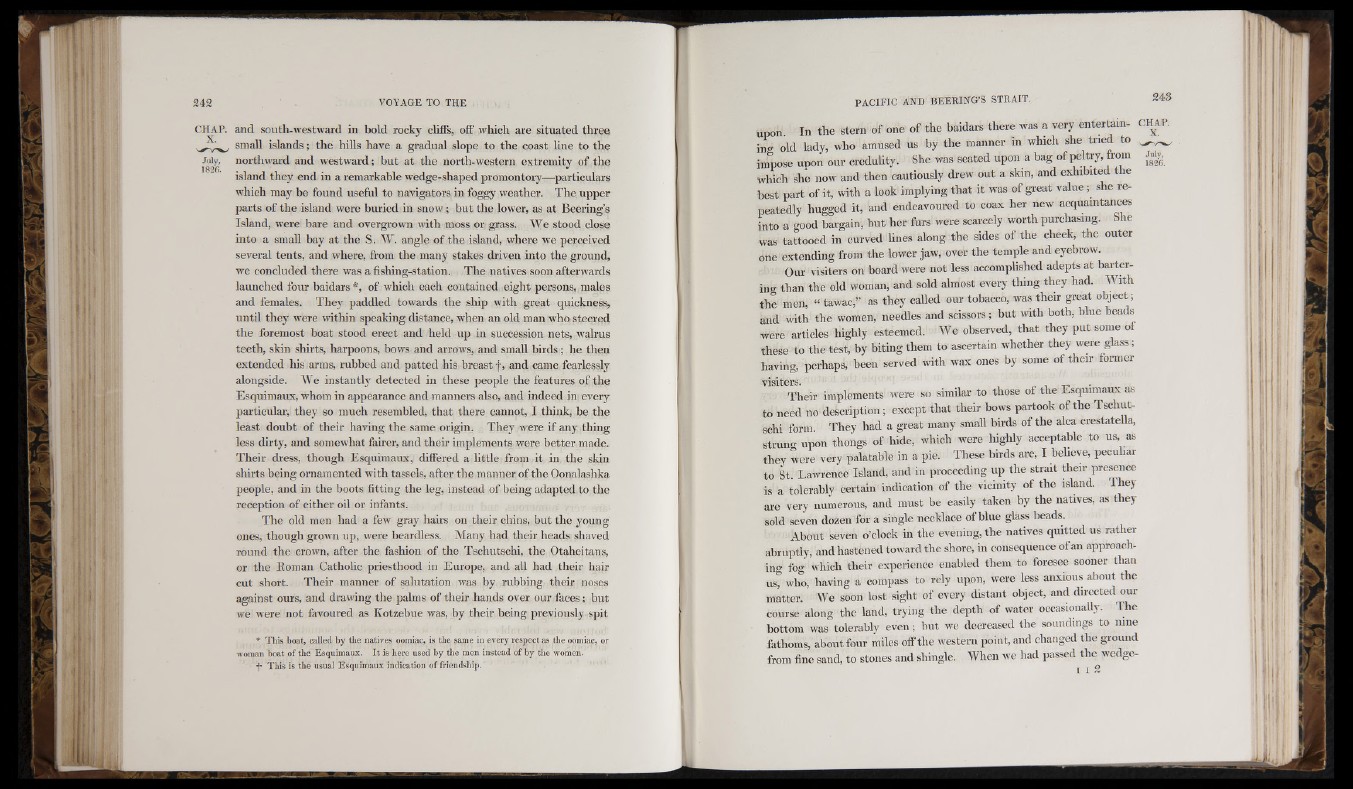
. !l I i
I 'I 'i
i ' , -
,! .
J -
CHAP. and south-westward in bold rocky cliffs, off which are situated three
Julv,
18 26.
small islands; the hills have a gradual slope to the coast line to the
northward and westward; but at the uorth-western extremity of the
island they end in a remarkable wedge-shaped promontory—particulars
which may be found useful to navigators in foggy weather. The upper
parts of the island were buried in snow; but the lower, as at Beering’s
Island, were bare and overgrown with moss or grass. We stood close
into a small bay at the S. W. angle of the island, where we perceived
several tents, and where, from the many stakes driven into the ground,
we concluded there was a fishiug-station. The natives soon afterwards
launched four baidars *, of which each contained eight persons, males
and females. They paddled towards the ship with great quickness,
until they were within speaking distance, when an old man who steered
the foremost boat stood erect and held up in succession nets, walrus
teeth, skin shirts, harpoons, bows and arrows, and small birds; he then
extended his arms, rubbed and patted his breast f , and came fearlessly
alongside. We instantly detected in these people the features of the
Esquimaux, whom in appearance and manners also, and indeed in every
particular, they so much resembled, that there cannot, I think, be the
least doubt of their having the same origin. They were if any thing
less dirty, and somewhat fairer, and their implements were better made.
Their dress, though Esquimaux, differed a little from it in the skin
shirts being ornamented with tassels, after the manner of the Oonalashka
people, and in the boots fitting the leg, instead of being adapted to the
reception of either oil or infants.
The old men had a few gray hairs on their chins, but the young
ones, though grown up, were beardless. Many had their heads shaved
round the crown, after the fashion of the Tschutschi, the Otaheitans,
or the Eoman Catholic priesthood in Europe, and all had their hair
cut short. Their manner of salutation was by rubbing their noses
against ours, and drawing the palms of their hands over our faces; but
we were not favoured as Kotzebue was, by their being previously spit
* This boat, called by the natives oomiac, is the same in every respect as the oomiac, or
woman boat of the Esquimaux. I t is here used by the men instead of by the women.
-f- This is the usual Esquimaux indication of friendship.
upon In the stern of one of the baidars there was a very entertain- CHAP.
ing old lady, who amused ns by the manner in which she tried to - _
impose upon our credulity. She was seated upon a bag of peltry, from
July,
18 26.
which she now and then cautiously drew out a skin, and exhibited the
best part of it, with a look implying that it was of great value; she repeatedly
hugged it, and endeavoured to coax her neiv acquaintances
into a good bargain, but her furs were scarcely worth purchasing. She
was tattooed in curved lines along the sides of the cheek, the outer
one extending from the lower jaw, over the temple and eyebrow.
Our visiters on board were not less accomplished adepts at barter-
in<r than the old woman, and sold almost every thing they had. Yhth
the men, “ tawac,” as they called our tobacco, was their great object;
and with the women, needles and scissors; but with both, blue beads
were articles highly esteemed. AVe observed, that they put some of
these to the test, by biting them to ascertain whether they were glass ;
having, perhaps, been served with wax ones by some oi their tormer
visiters.
Their implements were so similar to those of the Esquimaux as
to need no description; except that their bows partook of the Tschutschi
form. They had a great many small birds of the alca crestatella,
struno- upon thongs of hide, which were highly acceptable to us, as
they tvere very palatable in a pie. These birds are, I beUeve, peculiar
to St. Lawrence Island, and in proceeding up the strait their presence
is a tolerably certain indication of the vicinity of the island. They
are very numerous, and must be easily taken by the natives, as they
sold seren dozen for a single necklace of blue glass heads.
About seven o’clock in the evening, the natives quitted ns rather
abruptly, and hastened toward the shore, in consequence of an approaching
fog which their experience enabled them to foresee sooner than
ust who, having a compass to rely upon, were less anxious about the
matter. We soon lost sight of every distant object, and directed our
course along the land, trying the depth of water occasionally. The
bottom was tolerably even ; but we decreased the soundings to nine
fathoms, about four miles off the western point, and changed the ground
from fine sand, to stones and shingle. AVhen we had passed the wedge-
. . O
ii'i: